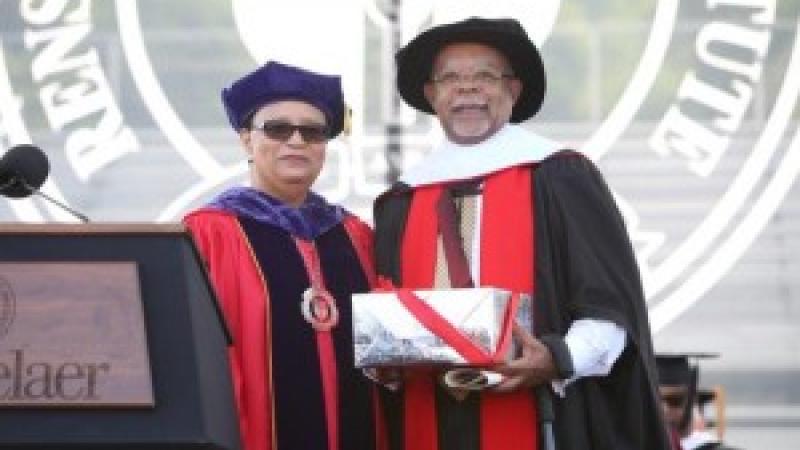June 12, 2015

Last month, on May 26, Rensselaer hosted a Twitter Q & A with 2015 Commencement honorand Henry Louis Gates, Jr. He received an honorary Doctor of Humane Letters degree during the 209th Commencement Ceremony held at Rensselaer on Saturday, May 30.
Dr. Gates is an Emmy Award-winning filmmaker, literary scholar, journalist, and cultural critic; he has authored 17 books and created 14 documentary films. His PBS documentary series, The African Americans: Many Rivers to Cross, earned an Emmy Award. He serves as editor-in-chief of TheRoot.com, a daily online magazine. The Henry Louis Gates, Jr. Reader, a collection of his writings, was published in 2012. He was awarded a “genius grant” by the MacArthur Foundation, and became the first African-American scholar to be awarded the National Humanities Medal. He is a member of the American Academy of Arts and Letters and serves on a wide array of boards.
During the Twitter Q & A, Dr. Gates shared some of his thoughts on the theme of personal and professional resilience.
How do you define resilience? Resilience is the capacity to recover, to meet and come to grips with whatever surprises destiny throws our way, and emerge unimpaired, even stronger for the experience. The great Samuel Johnson said about the art of conversation applies to resilience: ‘there must be presence of mind, and a resolution that is not to be overcome by failures.
What life experience taught you the power of resiliency? My younger daughter, Elizabeth, suffered a stroke when she was 28. She woke up one morning and had lost her power of speech. She could only speak 3 words. Her full recovery over the next several months shocked even her doctors. And it astonished her mother and me. Elizabeth Gates is my hero for resilience.
Who or what (company , organization, individual) best illustrates professional resilience in your eyes? As for professional resilience, I would say it is a tie between Muhammed Ali and Nelson Mandela.
What is the single most essential quality for leaders? Jazz offers the model for the quality that all great leaders share: the capacity to improvise. My advice to the graduating class: listen to jazz.
What is the biggest change you've noticed in the world within the past 10 years and how will it affect the future? The biggest change I’ve noticed over the last ten years, and the most worrisome, is radical religious fundamentalism, with a homicidal twist.
In 10 years, how do you expect your professional life to change? In 10 years, I hope to be able to spend more time with my first scholarly love: the eighteenth-century.
How does the increasingly interconnected world affect the challenges we face? Time and space seem simultaneous, no longer barriers. But communication and empathy remain barriers. That’s why the Arts and the Humanities are so urgently needed in the academy, now more than ever.
What’s the single best piece of advice you received from a colleague or mentor? The best advice I ever received in my life was from my father, as I got into my car to drive off to Yale for the first time: “If they don’t treat you right up there, you can always come on home.” I cried when he told me that. And that advice freed me not to fail.
What piece of advice should you have ignored? To come home from Yale! Good Lord, how my life would have been different without the blessed education I received at Yale between 1969 and 1973. I cried on the day I graduated. And without shame, I can honestly say that I love it, hopelessly, still.

Henry Louis Gates, Jr. Dr. Gates is the Alphonse Fletcher University Professor and Director of the Hutchins Center for African and African American Research at Harvard University.